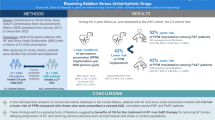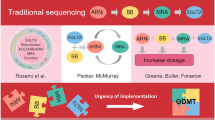Abstract
To evaluate the effect of a computerized Decision Support System (CDSS) on improving adherence to an anticoagulation guideline for the treatment of atrial fibrillation (AF). This study had an interrupted time series design. The adherence to the guideline was assessed at fortnightly (two weeks) intervals from January 2016 to January 2017, 6 months before and 6 months after intervention. Newly diagnosed patients with AF were included in the offices of ten cardiologists. Stroke and major bleeding risks were calculated by the CDSS which was implemented via a mobile application. Treatment recommendations based on the guideline were shown to cardiologists. The segmented regression model was used to evaluate the effect of CDSS on level and trend of guideline adherence for the treatment of AF. In our analysis, 373 patients were included. The trend of adherence to the anticoagulation guideline for the treatment of AF was stable in the pre-intervention phase. After the CDSS intervention, mean of the adherence to the guideline significantly increased from 48% to 65.5% (P-value < 0.0001). The trend of adherence to the guideline was stable in the post-intervention phase. Our results showed that the CDSS can improve adherence to the anticoagulation guideline for the treatment of AF. Registration ID: IRCT2016052528070N1.


Similar content being viewed by others
References
Chugh, S.S., et al., Worldwide epidemiology of atrial fibrillation: a Global Burden of Disease 2010 Study. Circulation. 129(8):837–847, 2014.
Mozaffarian, D., et al., Executive Summary: Heart Disease and Stroke Statistics--2016 Update: A Report From the American Heart Association. Circulation. 133(4):447–454, 2016.
Miller, P.S., Andersson, F.L., and Kalra, L., Are cost benefits of anticoagulation for stroke prevention in atrial fibrillation underestimated? Stroke. 36(2):360–366, 2005.
Caro, J.J., and Albers, G.W., Optimizing oral anticoagulation in managed care. Am J Manag Care. 10(14 Suppl):S474–S477, 2004.
O'Dell, K.M., Igawa, D., and Hsin, J., New oral anticoagulants for atrial fibrillation: a review of clinical trials. Clin Ther. 34(4):894–901, 2012.
Hart, R.G., Pearce, L.A., and Aguilar, M.I., Meta-analysis: antithrombotic therapy to prevent stroke in patients who have nonvalvular atrial fibrillation. Ann Intern Med. 146(12):857–867, 2007.
Potpara, T.S., et al., Decision-Making in Clinical Practice: Oral Anticoagulant Therapy in Patients with Non-valvular Atrial Fibrillation and a Single Additional Stroke Risk Factor. Adv Ther, 2016.
Kirchhof, P., et al., 2016 ESC Guidelines for the management of atrial fibrillation developed in collaboration with EACTS. European heart journal, 2016.37(38).
January, C.T., et al., 2014 AHA/ACC/HRS guideline for the management of patients with atrial fibrillation. Circulation. 130(23):e199–e267, 2014.
Lip, G.Y., et al., Refining clinical risk stratification for predicting stroke and thromboembolism in atrial fibrillation using a novel risk factor-based approach: the euro heart survey on atrial fibrillation. Chest. 137(2):263–272, 2010.
Pisters, R., et al., A novel user-friendly score (HAS-BLED) to assess 1-year risk of major bleeding in patients with atrial fibrillation: the Euro Heart Survey. Chest. 138(5):1093–1100, 2010.
Ogilvie, I.M., et al., Characterization of the proportion of untreated and antiplatelet therapy treated patients with atrial fibrillation. Am J Cardiol. 108(1):151–161, 2011.
Holt, T.A., et al., Risk of stroke and oral anticoagulant use in atrial fibrillation: a cross-sectional survey. Br J Gen Pract. 62(603):e710–e717, 2012.
Vallakati, A., and Lewis, W.R., Underuse of anticoagulation in patients with atrial fibrillation. Postgrad Med. 128(2):191–200, 2016.
Arts, D.L., et al., Effectiveness and usage of a decision support system to improve stroke prevention in general practice: A cluster randomized controlled trial. PLoS One. 12(2):e0170974, 2017.
Nieuwlaat, R., et al., Guideline-adherent antithrombotic treatment is associated with improved outcomes compared with undertreatment in high-risk patients with atrial fibrillation. The Euro Heart Survey on Atrial Fibrillation. Am Heart J. 153(6):1006–1012, 2007.
Sintchenko, V., et al., Comparative impact of guidelines, clinical data, and decision support on prescribing decisions: an interactive web experiment with simulated cases. J Am Med Inform Assoc. 11(1):71–77, 2004.
Ennis, J., et al., Clinical decision support improves physician guideline adherence for laboratory monitoring of chronic kidney disease: a matched cohort study. BMC Nephrol. 16:163, 2015.
Goud, R., et al., The effect of computerized decision support on barriers to guideline implementation: a qualitative study in outpatient cardiac rehabilitation. Int J Med. Inform. 79(6):430–437, 2010.
Kawamoto, K., et al., Improving clinical practice using clinical decision support systems: a systematic review of trials to identify features critical to success. Bmj. 330(7494):765, 2005.
Arts, D.L., et al., Improving stroke prevention in patients with atrial fibrillation. Trials. 14:193, 2013.
Bajorek, B., et al., A cluster-randomized controlled trial of a computerized antithrombotic risk assessment tool to optimize stroke prevention in general practice: a study protocol. BMC Health Serv Res. 14:55, 2014.
Holt, T.A., et al., Automated Risk Assessment for Stroke in Atrial Fibrillation (AURAS-AF)--an automated software system to promote anticoagulation and reduce stroke risk: study protocol for a cluster randomised controlled trial. Trials. 14:385, 2013.
Chen, R., et al., Early Experiences from a guideline-based computerized clinical decision support for stroke prevention in atrial fibrillation. Stud Health Technol Inform. 192:244–247, 2013.
Karlsson, L.O., et al., Clinical decision support for stroke prevention in atrial fibrillation (CDS-AF): Rationale and design of a cluster randomized trial in the primary care setting. American Heart Journal. 187:45–52, 2017.
Sheibani, R., et al., Effects of Computerized Decision Support Systems on management of Atrial Fibrillation: A Scoping Review. Journal of Atrial Fibrillation (JAFIB), 2017.10(1).
Wagner, A.K., et al., Segmented regression analysis of interrupted time series studies in medication use research. J Clin Pharm Ther. 27(4):299–309, 2002.
Rodríguez del Águila, M.M., and Benítez-Parejo, N., Simple linear and multivariate regression models. Allergologia et Immunopathologia. 39(3):159–173, 2011.
Goud, R., et al., The effect of computerized decision support on barriers to guideline implementation: a qualitative study in outpatient cardiac rehabilitation. International journal of medical informatics. 79(6):430–437, 2010.
Lobach, D., et al., Enabling health care decisionmaking through clinical decision support and knowledge management. Evid Rep Technol Assess (Full Rep). 203:1–784, 2012.
Cook, D.A., et al., An automated clinical alert system for newly-diagnosed atrial fibrillation. PLoS One. 10(4):e0122153, 2015.
Eckman, M.H., et al., Impact of an Atrial Fibrillation Decision Support Tool on thromboprophylaxis for atrial fibrillation. American Heart Journal. 176:17–27, 2016.
Hendriks, J.L., et al., Improving guideline adherence in the treatment of atrial fibrillation by implementing an integrated chronic care program. Neth Heart J. 18(10):471–477, 2010.
Setia, S., et al., Hypertension and blood pressure variability management practices among physicians in Singapore. Vasc Health Risk Manag. 13:275–285, 2017.
Funding
This study was funded by Mashhad University of Medical Sciences (thesis number 940843).
Author information
Authors and Affiliations
Contributions
SE, AH: conception and design of study, interpretation of data, and supervising the study. RS: software development, data collection, analysis and interpretation, and drafting manuscript. MS: data collection and interpretation, and critical revision. AA: conception and design, and critical revision. All authors read and approved the final manuscript.
Corresponding author
Ethics declarations
Conflict of interest
Authors declare that they have no conflict of interest.
Ethical approval
This study was approved by the Medical Ethics Committee of Mashhad University of Medical Sciences (IR.MUMS.fm.REC.1394.524). All procedures performed in the study were in accordance with the 1964 Helsinki declaration and its later amendments.
Informed consent
Informed consent was obtained from all cardiologists included in the study. Cardiologists’ information which must be considered as sensitive was not disclosed.
Additional information
This article is part of the Topical Collection on Mobile & Wireless Health
Rights and permissions
About this article
Cite this article
Sheibani, R., Sheibani, M., Heidari-Bakavoli, A. et al. The Effect of a Clinical Decision Support System on Improving Adherence to Guideline in the Treatment of Atrial Fibrillation: An Interrupted Time Series Study. J Med Syst 42, 26 (2018). https://doi.org/10.1007/s10916-017-0881-6
Received:
Accepted:
Published:
DOI: https://doi.org/10.1007/s10916-017-0881-6




